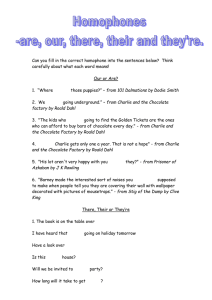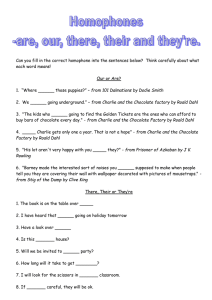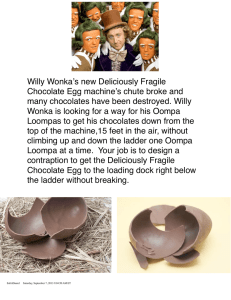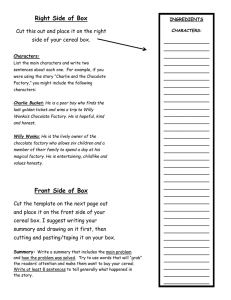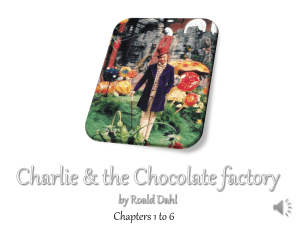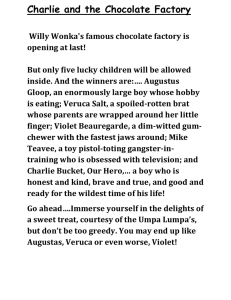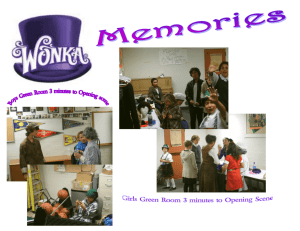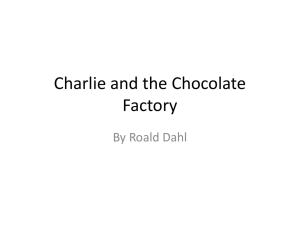Charlie and the Chocolate Factory
advertisement
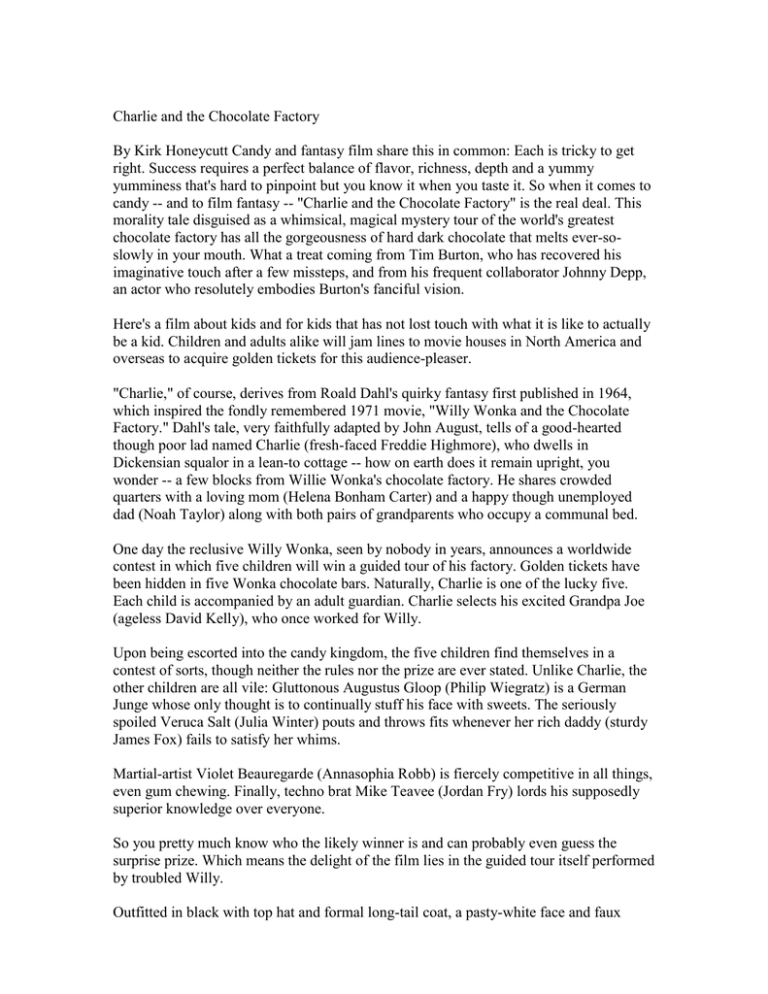
Charlie and the Chocolate Factory By Kirk Honeycutt Candy and fantasy film share this in common: Each is tricky to get right. Success requires a perfect balance of flavor, richness, depth and a yummy yumminess that's hard to pinpoint but you know it when you taste it. So when it comes to candy -- and to film fantasy -- "Charlie and the Chocolate Factory" is the real deal. This morality tale disguised as a whimsical, magical mystery tour of the world's greatest chocolate factory has all the gorgeousness of hard dark chocolate that melts ever-soslowly in your mouth. What a treat coming from Tim Burton, who has recovered his imaginative touch after a few missteps, and from his frequent collaborator Johnny Depp, an actor who resolutely embodies Burton's fanciful vision. Here's a film about kids and for kids that has not lost touch with what it is like to actually be a kid. Children and adults alike will jam lines to movie houses in North America and overseas to acquire golden tickets for this audience-pleaser. "Charlie," of course, derives from Roald Dahl's quirky fantasy first published in 1964, which inspired the fondly remembered 1971 movie, "Willy Wonka and the Chocolate Factory." Dahl's tale, very faithfully adapted by John August, tells of a good-hearted though poor lad named Charlie (fresh-faced Freddie Highmore), who dwells in Dickensian squalor in a lean-to cottage -- how on earth does it remain upright, you wonder -- a few blocks from Willie Wonka's chocolate factory. He shares crowded quarters with a loving mom (Helena Bonham Carter) and a happy though unemployed dad (Noah Taylor) along with both pairs of grandparents who occupy a communal bed. One day the reclusive Willy Wonka, seen by nobody in years, announces a worldwide contest in which five children will win a guided tour of his factory. Golden tickets have been hidden in five Wonka chocolate bars. Naturally, Charlie is one of the lucky five. Each child is accompanied by an adult guardian. Charlie selects his excited Grandpa Joe (ageless David Kelly), who once worked for Willy. Upon being escorted into the candy kingdom, the five children find themselves in a contest of sorts, though neither the rules nor the prize are ever stated. Unlike Charlie, the other children are all vile: Gluttonous Augustus Gloop (Philip Wiegratz) is a German Junge whose only thought is to continually stuff his face with sweets. The seriously spoiled Veruca Salt (Julia Winter) pouts and throws fits whenever her rich daddy (sturdy James Fox) fails to satisfy her whims. Martial-artist Violet Beauregarde (Annasophia Robb) is fiercely competitive in all things, even gum chewing. Finally, techno brat Mike Teavee (Jordan Fry) lords his supposedly superior knowledge over everyone. So you pretty much know who the likely winner is and can probably even guess the surprise prize. Which means the delight of the film lies in the guided tour itself performed by troubled Willy. Outfitted in black with top hat and formal long-tail coat, a pasty-white face and faux gullibility, Depp somewhat resembles Michael Jackson on a good day. He is a man deliberately disconnected from any reality so he can focus solely on childish delights. Through flashbacks, which cannot be found in Dahl's book, you learn that Willy's life is a complete reaction to an overly strict father (Christopher Lee), a candy-hating dentist. 9.Willy and Charlie, however, are on the same wavelength: They naturally gravitate toward those things in life that are cheerful, optimistic and good. Both banish the dark side with a breezy nonchalance. Charlie, for instance, sees no squalor or poverty in his home, only the love of a close-knit family. 10.Willy leads the party through rooms of wonder beginning with the Chocolate Room, a grassy landscape divided by a chocolate river and waterfall, dotted with candy trees and fudge hills. In another room, 100 trained squirrels sit on tiny stools and carefully remove nuts from their shells. And can you imagine a goofier image than a suspended cow struck repeatedly with tiny whips to produce, yes, Whipped Cream? 11.Throughout the factory, workers named Oompa Loompas perform such tasks as mining fudge and rowing a spun-sugar seahorse-shaped galley on the chocolate river. All Oompa Loompas are played by the same diminutive actor, Deep Roy, who has been further miniaturized and multiplied through motion-capture technology. 12. During the tour, each vile child is undone by his or her character flaw. At the moment a child is eliminated from competition, the Oompa Loompas break into marvelous song and dance numbers that utilize Dahl's lyrics from the book. (Danny Elfman wrote the spirited music.) In these numbers, Burton cannot resist kidding a range of Hollywood classics ranging from Busby Berkeley musicals and Esther Williams pool ballets to Beatles movies, "2001" and even "Psycho." 13. Generally, movies have viewed mechanization with suspicion, going back at least to Chaplin's "Modern Times." Not here though. From the opening credits, Burton & Co. glory in automated assembly lines that spin out sugary concoctions in all colors and flavors, in laboratories filled with boiling pots and strange pipes and in an elevator that impossibly moves up, down, sideways and through the roof. 14. Dahl was nothing if not a first-class production designer and Burton's team follow his suggestions to the max. To evoke this dream factory, Burton benefits from a third collaboration with the resourceful and dexterous cinematographer Philippe Rousselot, who turns Alex McDowell's edible-looking sets into a confectioner's wonderland. Nick Davis' visual effects, Gabriella Pescucci's not-quite-old, not-quite-new costumes and Chris Lebenzon's smooth editing makes the chocolate factory one of the best fantasy worlds this side of Oz.
